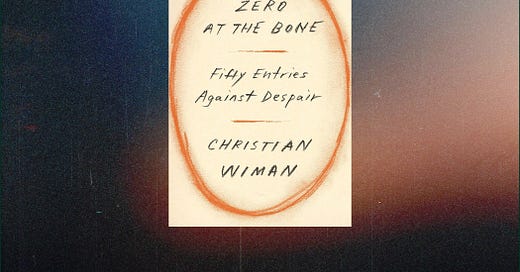
Poetry, a Matter of Life and Death
Facing his mortality, poet Christian Wiman uses literary tools and personal faith to deal honestly with ultimate questions.
Zero at the Bone
Fifty Entries Against Despair
by Christian Wiman
FSG, 320 pp., $30
“I’VE RECEIVED SOME LETTERS asking me to state publicly my editorial position so that writers will have a sense of whether or not to submit their work,” wrote Christian Wiman in the November 2003 edition of Poetry magazine. The issue was the second of his tenure as editor. In his two-page statement, Wiman claims he would rather not articulate an editorial position “partly because I suspect that most editors who have an editorial policy” are “bores,” but he then proceeds to unpack his own: “The poems I respond to most deeply,” he writes, “are those that emerge out of some passionate tension between life and language, poems in which you feel—not always in equal measure—life and language trying to be each other.” These are not the words of a bore.
Consider the range of his references. In the piece—which is, again, only two pages long—Wiman offers a quotation from Nietzsche, remembers a “firebrand” preacher from childhood declaiming about the fate of “lukewarm” believers of Judgment Day, and leaves readers with this rueful line from the poet Marianne Moore: “some have it lightly; some will die.” Following this provocative starting point, Wiman would serve as the editor of the influential literary magazine for a decade. During that time, Poetry’s circulation tripled, and the honors it collected include two National Magazine Awards.
But halfway through his editorship, Wiman was diagnosed with Waldenström’s macroglobulinemia, a cancer of the blood “as rare as it is mysterious.” He had been married to his wife less than a year when he got the diagnosis. “In those early days,” he wrote, “we mostly just sat on the couch and cried.” Although he “alone was dying,” they were “mourning very much together”: not his death, “but the death of the life we had imagined with each other.” Some have it lightly; some will die.
Consider the foregoing points of data as raw materials: Wiman’s great editorial talent, the range of his reading, his curatorial gift for creating a literary conversation, the depth of his grief and suffering, his plucky gifts as a writer. Smelt them into a single alloy, and you might have something that looks like his latest book, Zero at the Bone. The uniquely conceived collection of 52 essay-like fragments touches on weighty themes—life, literature, God, and language—while ultimately offering a stay against despair, a subject Wiman knows better than most.
SOON AFTER RECEIVING his diagnosis, Wiman writes, “we found ourselves going to church.” The passive construction is purposeful: He and his wife felt drawn to go as though by some external force. His recollection of the first service they attended throws as much light on religious psychology as anything in Jonathan Edwards’s Religious Affections: “[It] was excruciating, in that it seemed to tear all wounds wide open, and it was profoundly comforting, in that it seemed to offer the only possible balm.”
The experience was like sending a current traveling through an old and dusty but still intact circuit board. Wiman was raised in Snyder, a small town in West Texas. His family was Baptist; he describes his kin as “charismatic evangelicals” whose faith was “very visceral, very emotional.” As a result, Wiman’s childhood was “just saturated in religion.” They went to church on Wednesday nights and twice on Sunday. His family would “memorize Bible verses and say them before the meals.” Later, he became “an ambivalent atheist . . . beset with an inchoate loneliness and endless anxieties, contemptuous of Christianity but addicted to its aspirations and art.”
His memories of becoming a recrudescent churchgoer are about “less the services themselves” than the walks that he took with his wife afterward, and “the moments of silent, and what felt like sacred, attentiveness” that arose from that time together. Quoting the Apostle Paul, Wiman writes that he embraced a “hope toward God.”
In 2012, Bill Moyers, interviewing Wiman, shared a clip of Australian critic Clive James, who said, “The fact that there is no heavenly power that intervenes [in life] has been obvious since I was a kid. If there had been, it would have brought my father home. If there had been a heavenly power that could intervene, that power would have saved the children from the death camps.” (James’s father had survived a Japanese prisoner-of-war camp but died when the plane flying him home crashed.)
Moyers asked Wiman for his thoughts on James’s words. Although “sympathetic” to the critic’s sentiment, Wiman said, “Clive is projecting a human God. . . . He’s angry at God for allowing these things to happen. But that is a projection; that is a humanized notion of what God is, and I think we have to get beyond that.”
This is where Wiman’s religious vision becomes challenging and necessary; it is, among other things, an invitation to mysticism and to the dark path of blind spiritual contact, the via negativa. It chastens those who make confident pronouncements about spiritual and theological matters—and in a moment of increasingly partisan religious commitment, you might call that God’s work.
In Zero at the Bone, Wiman shares and ponders a bevy of poems, essays, and philosophies, each one a step into a higher darkness. (A syllabus crafted from his citations would make for a fine course, perhaps like the ones that Wiman teaches at the Yale Divinity School.) After including “Domination of Black” by Wallace Stevens—a God-haunted poet who maintained a long, emotional correspondence with a Catholic nun—Wiman concludes: “I don’t know what this poem means, except that it means more than I know.”
This provides an apt summary of Wiman’s religious vision: God is more than us, more than we can ever know, and in that unknowing we find freedom. Other clips from proponents of unknowing reinforce his point. St. Augustine hammers the theme on the divine—“If you think you have understood God, it is not God”—and a riff from American poet William Bronk’s essay “Costume as Metaphor” makes a similar case about immanent reality: “We know nothing of the world and will never know. All we say is metaphor which asserts at once our unknowing and our need to state in some language what we don’t know.”
Religious faith lives in that space between unknowing and knowing, between the ineffable and the prosaic, and for the believer with a strong sense for the world’s fundamental mystery, faith can offer an irreplaceable anchor. Of course, that isn’t the topline story about faith these days. Wiman admits to being “somewhat ambivalent about religion—and not simply the institutional manifestations, which even a saint could hate, but sometimes, too many times, all of it, the very meat of it, the whole goddamned shebang.” But even so, the “question of faith,” he affirms, “is the single most important question that any person asks in and of her life, and that every life is an answer to this question, whether she has addressed it consciously or not.”
When we reach for God, we are being both helpless and markedly ambitious. This paradox is one of many that faith either introduces or uncovers within normal life, depending on whether you find it enabling or not; as translator Anne Davenport has written, paradox is the “precise phenomenal form” of eternity interrupting the temporal world. For Wiman, when God becomes man in the person of Christ, as traditional Christian theology has always held, the paradoxes of Christianity become urgent, a matter of life or death: “There was no going back: either the incarnation is absolute, or it simply didn’t happen. Either God is gone, or he never was.”
Wiman has reached for God through reading and writing poetry. It is a prominent genre in scripture for good reason. Poetry, he testifies, “is where human language retains, resuscitates, protects, and extends its natural origins.” It is “both nerve and notion, instinct and abstraction.” It brings things together that are normally separate; it unveils paradox. There are utilitarian reasons for reading poetry, of course; after twenty years in the classroom, I can attest that no other literary mode better teaches students the power of paradox, or strengthens their sense of syntax. Wiman has a loftier reason for his engagements with it: Poetry is a prolegomenon to eternity. It bids it welcome while also harrowing the soul, as Tarkovsky said, to prepare a person for death.
We are compelled to create, Wiman argues, from “an overabundance of life and a deficiency of it.” In both moments, our bodies become vessels; we give the soul an untrammeled reign. Language, however imperfect and futile, is its sacred tool. While Wiman has known the abundance, the deficiency brought on by his rare illness is what has motivated him for over a decade to take up the pen. But in one further paradox, Zero at the Bone shows that sometimes life’s abundance and its depredations go out and come in together. To paraphrase a great poet, it is sometimes in giving up your life that you find it. And that’s a counsel against despair if I’ve ever heard one.

















